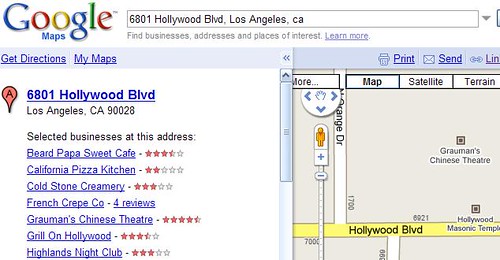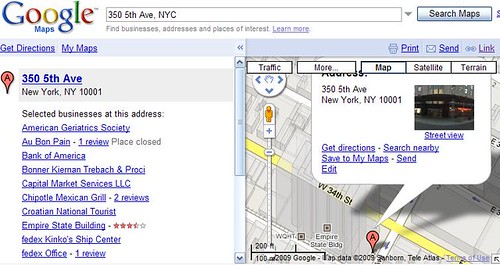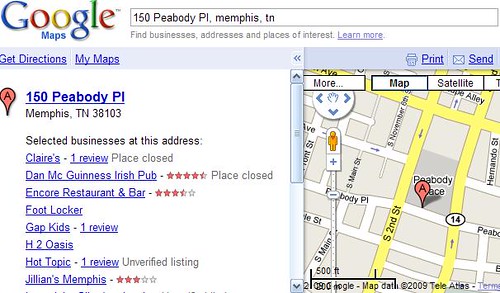Leveraging Reverse Search For Local SEO
A couple of years ago when local search engine optimization started becoming a hot topic, I winced when I heard other search marketers recommending that local businesses include their street address in all page titles. Not only did this seem like overkill to me, but the school of “everything-and-the-kitchen-sink” in title tags can result in relevancy […]
A couple of years ago when local search engine optimization started becoming a hot topic, I winced when I heard other search marketers recommending that local businesses include their street address in all page titles. Not only did this seem like overkill to me, but the school of “everything-and-the-kitchen-sink” in title tags can result in relevancy dilution for a site trying to rank highest for its most important keyword phrases.
But, here’s the exception case for when street addresses included in a page’s title tag can be very advantageous for a business.
As I’ve written previously, most local businesses should include their business name, category, and city name in their page titles, particularly on their homepage.
Some businesses are fortunate enough to be located at a particularly famous street address. From a business marketing perspective, such addresses are significant because they provide possibility of an advantage that these businesses can further exploit. In the offline world, a business that’s located at a popular or famous location already has a built-in advantage in terms of automatically having street traffic or foot traffic—some percentage of which is likely to convert. If you observe the built-in advantage these businesses enjoy, you’d quickly become a proponent of the old local marketing credo, “Location, location, location!”
These business also enjoy the online equivalent of the popular location, since a relatively larger number of people are likely to type the address into search engines and local search engines in order to get maps and other information about the location.
Google Maps has noticed this propensity and has helpfully provided reverse search results for addresses.
Imagine if your business was located in the shopping center where Grauman’s Chinese Theatre is located in Los Angeles, or if your business was one of those which shares space in the Empire State Building in New York City. Here’s what Google Maps shows when one searches for either of those famous addresses:
Grauman’s Chinese Theatre Google Maps Address Search
6801 Hollywood Blvd, Los Angeles, CA
Empire State Building Google Maps Address Search
350 5th Ave, New York, NY
Google is helpfully listing around twenty of the businesses located at that address alongside the map. To appear beside the map, Google likely bases this upon the business address that they have in their Google Local database (if your business isn’t already listed there, you could register in the Google Local Business Center). However, users are committing street address searches in the regular keyword search side as well—and pages which have that street address reflected in the title are more likely to appear in the street address search results.
Your business doesn’t have to be located in quite as such a high-visibility location as Grauman’s Chinese Theatre or the Empire State Building in order for there to be sufficient cause to optimize for street address searches. For instance, there are a lot of businesses around the country that are located at large shopping centers, local landmarks, and tourist hotspots.
For instance, Peabody Place in Memphis, Tennessee, is both a tourist hotspot due to being attached to the famous Peabody Hotel, and it’s also a shopping center. Conceivably, there could be quite a number of people who would type its street address into search engines, and businesses associated with that address will appear in the reverse search results:
Peabody Place Google Maps Address Search
150 Peabody Pl, Memphis, TN
Once again, this optimization tactic should really be reserved more for those businesses that are located at addresses which are somehow significant and therefore likelier to be independently searched upon. If it’s likely that users will search by the street address, then there’s maybe going to be enough traffic to justify having that address info in one of the business’s title tags. Having the business appear as a sort of “reverse search result” when users search by address gives opportunity that more consumers will notice the business and become customers.
But, far more businesses in the country are located at insignificant addresses. If your business is the only thing located at your street address, it’s a safe bet that too few people will be searching for your street address by itself to justify watering down your title to include it. Far greater advantage is to be had for these businesses if they come up higher in the rankings for their “bizname + city” and “category + city”. If the street address was included in the title in this case, it would dilute the relevancy on the more advantageous keyword phrases.
Just as with many tactics in search marketing, one size does not fit all. For those businesses which have a popular street address, this tactic can include a real bump up in online prominence which could also translate into more real world customers.
Contributing authors are invited to create content for Search Engine Land and are chosen for their expertise and contribution to the search community. Our contributors work under the oversight of the editorial staff and contributions are checked for quality and relevance to our readers. The opinions they express are their own.
Related stories
New on Search Engine Land


